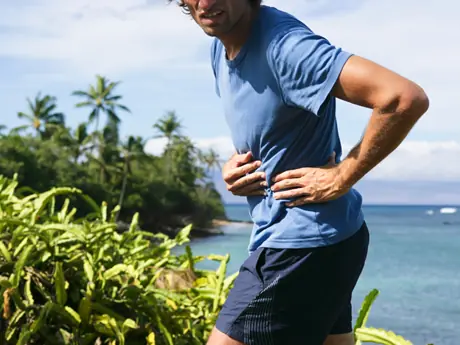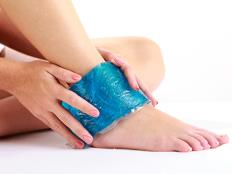
Have you ever been enjoying a great run, hitting your goal pace effortlessly, when all of a sudden a dreaded side stitch stops you dead in your tracks? You're not alone. This common affliction has disrupted many runners' workouts.
Side stiches typically occur on one side of your abdomen underneath the ribs. You'll feel a sharp stab or a burning ache that can often last the entire run. Although it is a nuisance that can disrupt the flow of your run, a side stitch is not an injury and won't cause any permanent damage. Here are some causes and treatments to help you run easier with no pain.
What Causes Side Stitches?
Scientists actually aren't certain of their cause, leaving runners to compulsively rub their abdomens when they experience a stitch. Some theories behind the cause of side stitches include eating a large meal or drinking a lot of fluid too close to your run, a loss of blood flow to the diaphragm due to the redistribution of blood to the stomach for digestion, and irritation of the diaphragm due to the bouncing of internal organs that pulls the diaphragm down.
How to Prevent Side Stitches
Avoid large, heavy meals in the two hours before your run, race or workout. Whether a big meal diverts blood away from the abdomen or contributes to diaphragm "pulling" is uncertain, but many runners report fewer side stitches by making this one change.
More: The 6 Best Small Meals to Eat Before a Run
Also avoid gulping too much fluid right before your run. Becoming properly hydrated takes longer than an hour or two, so monitoring hydration level (make sure your urine is pale yellow or straw-colored) every day is more important.
Stretching may also help prevent side stitches, but this preventive measure should be accomplished with limited static stretching. A warm-up that includes dynamic stretching, flexibility exercises and light strength movements is more appropriate. This type of warm-up will help increase blood flow, heart rate and range of motion and is far more effective at preparing you for a workout.
- 1
- of
- 2
About the Author

Get ACTIVE on the Go


Couch to 5K®
The best way to get new runners off the couch and across the finish line of their first 5K.
Available for iOS | Android






Discuss This Article